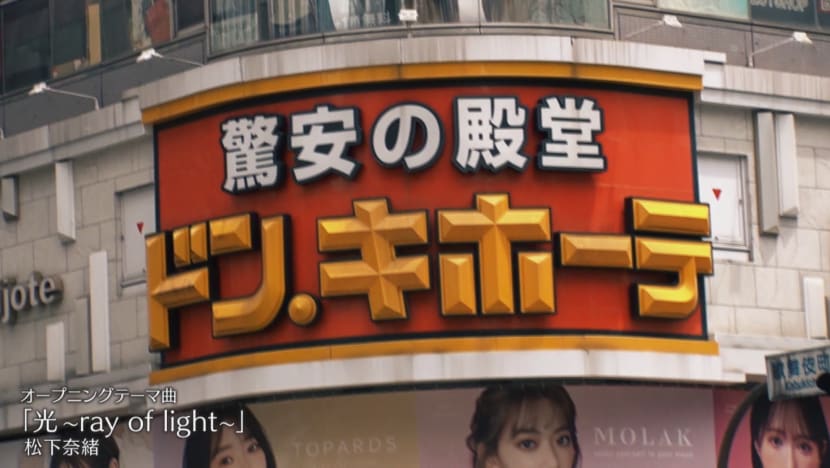"Donki"- King Of Japanese Discount Store
Don Quijote is the theme of this week's episode, exploring how it sets up speciality stores and its efforts to transform a community-based supermarket into a successful outfit by making bold changes.

This week, we focus on Japanese discount store Don Quijote - also known as Donki - which can be found at more than 200 locations around the world. We zoom in on its efforts to set up speciality stores and embark on a Don Quijote-style makeover of a community-based supermarket it acquired many years ago.
We first visited the store’s Nakameguro branch in Tokyo. It boasts the highest earnings nationwide and has a whopping 70,000 products. According to the store’s manager, Mr Akinori Morinaga, one of the most popular items is its own brand of mixed nuts. Don Quijote has about 4,000 types of housebrand items. Its stores are also known for flashy signs. The company has expert signage artists stationed at every store. One thousand artists are stationed at stores nationwide. One such employee is Ms Motomiya, who has 20 years of experience and works at the store in Nakameguro.
Don Quijote has many different varieties and categories of products, so it is constantly changing the way it sets up its stores, to prevent its customers from losing interest. Its sales and operating profit were declining because of COVID-19 and tough competition from other stores. Mr Kosuke Suzuki, the executive officer of Don Quijote, thus decided to set up more speciality stores. He joined the company after graduating and has been with Don Quijote for 22 years. He was appointed as the executive officer in 2017.
One of the speciality stores is Kyokara Donki at the Moraju Kashiwa shopping mall in Kashiwa City, Chiba Prefecture. It specialises in spicy items and has more than 1,000 products, such as the “Extremely Spicy Katsu”, Hot Honey, a super spicy sauce called Drop of Hell and the usual spicy instant noodles. Other speciality shops include Cosme Donki for cosmetics, Osake Donki which sells alcohol from all over the world, and a “Men’s” Donki. There are about five kinds of speciality Donki stores in nine locations.
During a review of its stores, the management noted that the Okashi Donki outlet in the Yaesu Underground Shopping Mall in Tokyo Station has suffered a drop in earnings. It carries about 30,000 items, including familiar local snacks and those from other countries. So Mr Suzuki decided to do something about it. He engaged Mr Naoto Kawata, a product purchaser, to hunt for new products. They checked out Asia's largest food exhibition, Foodex Japan 2022, and came across gummies from the US. They placed a bulk order to be delivered to the chilled and frozen distribution centre in Tochigi. The gummies are shaped like fast-food items. Mr Kawata purchased 20 types of gummies, weighing a total of 4.5 tonnes. The gummies arrived at Okashi Donki in late April 2022. A third of the newly transformed store was filled with gummies and they became an instant hit. This resulted in a tripling of profit for that week compared to the week before.
Mr Suzuki also wanted to create a new store targeting customers in their late teens to early 20s. He gathered the company’s employees who are in their early 20s to get their feedback. The young employees were put in charge of setting up the store, including choosing the products. In May 2022, during Golden Week, the new speciality store created by the young employees opened in a shopping mall in Daiba, DiverCity Tokyo Plaza. Called Kirakira Donki, the products focus on popular Asian brand cosmetics and snacks with cute packaging. The cosmetics area has many small signs that are unusual for Don Quijote. One example is a sign designed to look like a smartphone. Furthermore, QR codes allow customers to view limited-edition items and other popular products. In the drinks corner, the signs are concise and simple, vastly different from the wordy signs at Don Quijote. At the food corner, a photo spot has been set up so that customers can post pictures on social media.
In 2007, Don Quijote acquired the Nagasakiya supermarket chain and the stores changed to Mega Don Quijote, which carries perishable foods and everyday items. In 2019, the general merchandise store, mainly located in the Tokai region and called Uni, became their wholly owned subsidiary. Don Quijote also procured the shopping mall business that Uni was developing.
In 2019, the community-based Apita supermarket became Donki Group’s subsidiary company. There are found at 48 locations in the Central region and 12 locations in the Kanto region. The person in charge of Apita is Mr Ryuichi Kimura, who is from Don Quijote. He was previously working at Nagasakiya for more than 20 years. In February 2022, Mr Kimura visited the Kisogawa branch of Apita in Ichinomiya City, Aichi prefecture. He took charge of renovating the second floor of Arpita, which housed the clothing department. He came up with the idea of opening a Don Quijote outlet at a conspicuous location on the second floor.
The Kisogawa store re-opened at the end of April 2022, with Don Quijote occupying half of the second floor together with the original clothing section. Mr Kimura also renovated and kept Apita's clothing department. Some new items were added to the original inventory to make it more fashionable and appealing. This way, he managed to attract new customers, while retaining the regular ones.
Tips:
1) Check out Don Quijote’s speciality stores in Japan, each targeting a different segment of the population
2) Food exhibitions are a good avenue to source for new products from other countries












